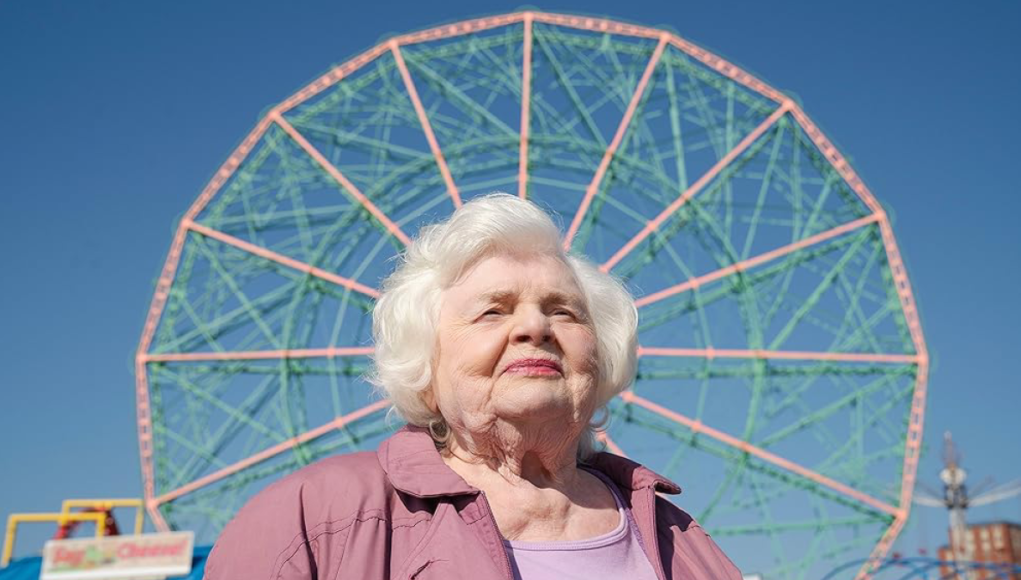Scarlett Johansson gives audiences a terrific gift with Eleanor the Great by offering June Squibb a role worthy of her talents.
The 95-year-old Academy Award–nominated actress who thrilled this critic last year with the pitch-perfect action-comedy Thelma brings her wonderful moxie to the title role, delivering a performance that is side-splittingly funny and tear-jerkingly poignant.
While the premise of this movie will raise eyebrows, Squibb’s approach to the material is flawless. Her comedic timing is deliciously sharp, whether dressing down a rude grocery store employee or backhand complimenting her onscreen daughter (Jessica Hecht). It’s the kind of shrewd humor mastered by tough-as-nails grannies, and memorialized in The Golden Girls.
‘The Thursday Murder Club’ review: ‘Only Murders’ fans, brace for your new cozy crime fixation
Yet beyond these biting barbs, Eleanor is also thrilling for how she refuses to be ignored. She’ll push back against those condescending strangers — always younger — who write her off as some dotty ol’ biddy. And she won’t flinch to make others uncomfortable when it comes to expressing herself, even in grief.
Now, how she goes about that is certainly the film’s most challenging element. But through Eleanor’s misadventures, Eleanor the Great becomes a beautiful — albeit bumpy — comedy about the agony and ecstasy of love and grief.
What’s Eleanor the Great about?
After a social mishap, 94-year-old Eleanor Morgenstein (Squibb) lies about being a Holocaust survivor. But in the screenplay by Tory Kamen, the how and why of this shocking act are pretty compelling. For one thing, she’s not doing it to gain anything — except a way to remember her late best friend.
You see, Eleanor the Great begins with Eleanor and Bessie (Rita Zohar), besties for decades who have supported each other through marriage, children, grandchildren, and widowhood, eventually moving to an apartment in Florida where they were roomies for 11 years. And then, Bessie died.
Alone and yearning for connection, Eleanor moves back to New York City, where her daughter Lisa and grandson Max (Will Price) live. But their bustling schedules mean she’s still alone. In search of community, she stumbles upon a support group of Holocaust survivors at the Manhattan Jewish Community Center. Eleanor wasn’t one, but Bessie was. To share Bessie’s stories as if they were her own with the group allows Eleanor a space to remember the friend she misses. But this deception grows deeper when a journalism student named Nina (Erin Kellyman) asks to profile Eleanor. As the two women grow close, it’s harder and harder to admit their bond began over a lie — especially when Nina’s dad, a newscaster named Roger (Chiwetel Ejiofor), gets involved.
Mashable Top Stories
Eleanor the Great revels in the beauty of friendship and the value in grieving.
Missing Bessie, Eleanor makes some shocking choices to forge a new friendship with Nina. But by Eleanor’s sharing her grief — even masked as it is through Bessie’s stories — she gives Nina a space to speak about her own, as Nina lost her mother just six months earlier. Obviously, they’re going through different kinds of mourning, but just having someone who will let you talk and cry makes a big difference.
Even with our best friends, grief can be hard to talk about, which Eleanor the Great recognizes. Sure, friends want to be supportive. But grief is big and scary and reminds us of death. So, we push it away as best we can, even when it means pushing away those we love.
But grief is an ocean, and we’re all flowing toward it. We cannot escape it. Staying afloat in it is exhausting, and it can feel at times as if you’ll drown in it.
The Greatest Generation, of which Squibb, Eleanor, and Bessie, are a part, lived through the horrors of World War II. Then they were basically encouraged to buck up and carry on. I saw this in my own grandparents, some who fought in the war, some who faced world-rattling deaths at home. They put a wall around the pain of these times, and even as I became an adult, I only got brief glimpses into their experiences with such grief. I saw them tremble, swallow it, and barrel on, over and over. And now they’re gone, and I contain an ocean for all of them.
Eleanor, however, rejects this attitude of silence, and so becomes the ear Nina needs, and vice versa. The tears they spill remembering those they loved and lost are hard. But within this crying, they also revel in those people, those personalities, and those quirks. There’s a deep joy in that, and that would be lost if we didn’t brave the tears.
Eleanor the Great is a solid New York City story with a wobble at the end.
Like Mikey Madison in Anora, Eleanor the Great is a character-centered comedy in New York City that depends intently on the resilient lead shouldering the world around them. And Squibb does this with seeming effortlessness. (Also, both movies have pivotal scenes in Coney Island.) In this portrayal, she not only gives another entertaining and deeply funny turn, but also commits to cinema another aspirational take-no-shit granny. She reminded me of my own, and that too made me cry, because I miss her. But like the women in this movie, it’s a pain and a pleasure to remember the incredible lady I lost.
To Johansson’s credit, the movie — while leaping locations, delving into flashbacks, and handling several sensitive topics — flows well, carried by the screen presence of Squibb and her terrific grandma-granddaughter chemistry with Kellyman. They share a love and respect that never fumbles into the pitfalls of ageist assumptions of either the elderly or the young.
However, the final act gets away from Johansson, as it veers from a fairly grounded film into the treacly sentimentality of a Hallmark movie. A climactic news report feels convenient and unconvincing, considering how everything that’s come before felt more or less feasible. It feels like Johansson and/or Kamen felt that after such a shocking lie, scads of sugar needed to be poured on the ending to help the movie’s medicinal message go down. It’s not enough to ruin the experience, but it undercuts Eleanor to make so much of the conclusion about someone else’s idea of her.
This qualm aside, I loved Eleanor the Great. As someone grappling with grief, I could relate to the heroines’ yearning to discuss it and fear doing so would isolate them. I cried with them and laughed with them. In the end, I was a mess. But my heart was also full, thanks to Eleanor, which was pretty great.
Eleanor the Great was reviewed out of the Toronto International Film Festival; the movie will open in theaters in the U.S. on Sept. 26.













